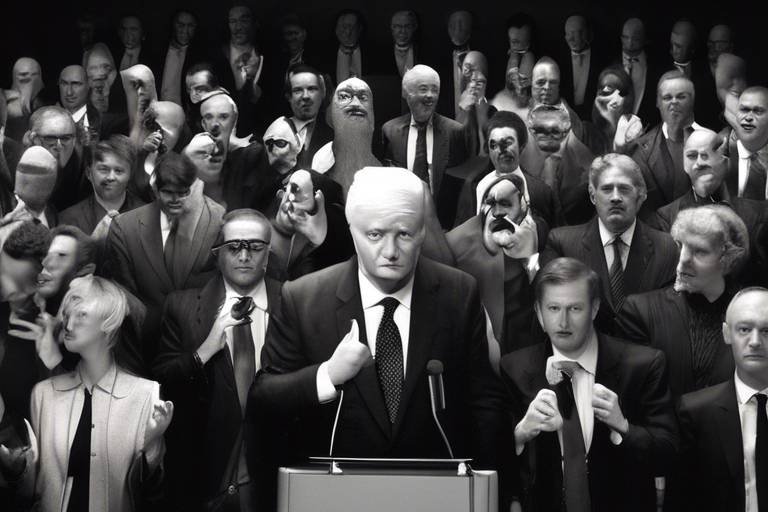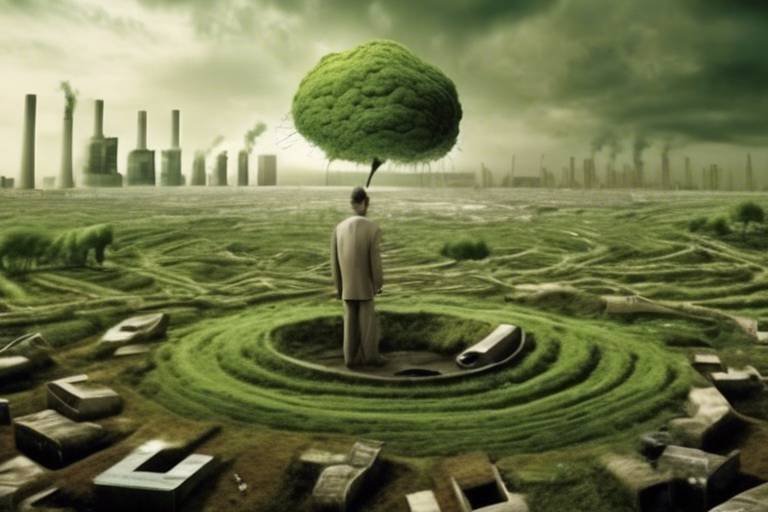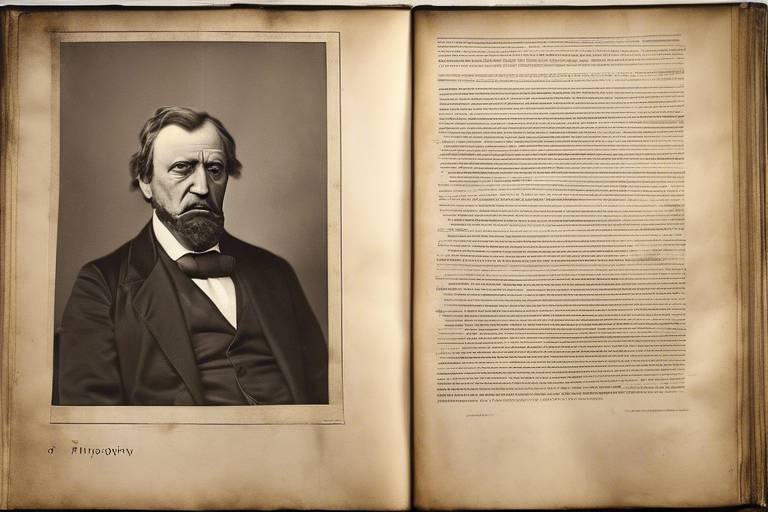Philosophy, Politics, and the Globalization Controversy
Globalization is more than just a buzzword; it's a complex phenomenon that intertwines with various aspects of our lives, including philosophy and politics. It raises questions that challenge our understanding of identity, culture, and economic structures. As we navigate through this intricate web, we find ourselves asking: What does it mean to be a part of a global community? How do our political ideologies shape our perceptions of globalization? And perhaps most importantly, what are the ethical implications of our interconnectedness?
At its core, globalization refers to the increasing interconnectedness of the world's economies, cultures, and populations. This process is fueled by advancements in technology, communication, and transportation, which have made it easier than ever for ideas, goods, and people to cross borders. However, the implications of this phenomenon are far-reaching and often controversial. While some celebrate the potential for economic growth and cultural exchange, others warn of the dangers of cultural homogenization and the erosion of local identities.
The philosophical debates surrounding globalization are as diverse as the cultures it affects. Thinkers from various backgrounds contribute to the discourse, offering insights that help us understand the nuances of global interconnectedness. For instance, liberal philosophers often advocate for the benefits of free markets and open borders, arguing that globalization fosters innovation and prosperity. Conversely, socialist philosophers critique globalization for perpetuating inequalities and exploitation, emphasizing the need for equitable resource distribution.
As we delve deeper into this discussion, we must also consider the political perspectives that shape our understanding of globalization. Different political ideologies interpret the effects of globalization in distinct ways. For example, liberalism tends to view globalization as a pathway to economic growth and increased opportunities, while socialism often sees it as a threat to social justice and labor rights.
Ultimately, the globalization controversy invites us to reflect on our values and priorities as a society. It challenges us to think critically about how we balance the benefits of economic growth with the preservation of cultural identities. Are we willing to sacrifice local traditions for the sake of global integration? Or can we find a way to embrace globalization while honoring the unique characteristics that define our communities?
- What is globalization? Globalization refers to the process of increased interconnectedness and interdependence among countries, cultures, and economies.
- How does globalization affect local cultures? Globalization can lead to cultural exchange, but it may also result in cultural homogenization, where local identities are diminished.
- What are the political implications of globalization? Different political ideologies interpret globalization differently; liberalism often sees it as beneficial, while socialism critiques it for promoting inequality.
- What ethical dilemmas arise from globalization? Issues such as environmental sustainability, human rights, and economic exploitation are key ethical concerns in the context of globalization.

The Philosophical Foundations of Globalization
Globalization is not just a buzzword; it’s a profound phenomenon that reshapes our world in ways we often overlook. At its core, globalization is about interconnectedness—how our lives, economies, and cultures are woven together across borders. To truly understand this complex tapestry, we must delve into the philosophical foundations that underpin these discussions. Various thinkers have contributed to the discourse, offering insights that help us navigate the murky waters of global interaction.
One of the most influential philosophical perspectives comes from Immanuel Kant, who envisioned a cosmopolitan world where individuals are treated as ends in themselves rather than means to an end. Kant's idea of a universal moral law suggests that globalization should promote human dignity and rights across the globe. This perspective raises critical questions: Are we genuinely fostering a global community, or are we merely exploiting resources and labor for our gain?
Another significant contributor to the philosophical conversation around globalization is Friedrich Nietzsche. He challenges us to rethink our values and the implications of a global culture that often prioritizes economic growth over individual identity. Nietzsche’s concept of the "will to power" invites us to consider how globalization can empower individuals and communities, but it also warns against the dangers of cultural homogenization. Are we losing the essence of what makes us unique in the pursuit of a global identity?
Moreover, we cannot ignore the contributions of Marxist theory, which critiques globalization as a tool for capitalist expansion. Marxists argue that globalization exacerbates inequality and exploitation, leading to a concentration of wealth among the few while disenfranchising the many. This perspective emphasizes the need for a critical examination of who benefits from globalization and who bears the brunt of its consequences.
In addition to these philosophical frameworks, there are also ethical considerations that arise from globalization. The challenge lies in balancing the benefits of global trade and cultural exchange with the potential for exploitation and environmental degradation. This leads us to ponder: how can we ensure that globalization serves the greater good? The answer may lie in adopting a more sustainable and equitable approach to global interactions, one that recognizes our shared humanity while respecting cultural differences.
Ultimately, the philosophical foundations of globalization compel us to engage in a deeper dialogue about our responsibilities as global citizens. As we navigate the complexities of a connected world, we must ask ourselves not just what globalization can do for us, but what we can do to make globalization a force for good. The insights from various philosophers provide a roadmap for this journey, guiding us toward a more inclusive and ethical global society.
- What is globalization? Globalization refers to the process of increased interconnectedness among countries, driven by trade, investment, technology, and cultural exchange.
- How does philosophy relate to globalization? Philosophy provides frameworks for understanding the ethical, moral, and social implications of globalization, influencing how we perceive global interconnectedness.
- What are the main philosophical perspectives on globalization? Key perspectives include Kant's cosmopolitanism, Nietzsche's critique of cultural homogenization, and Marxist critiques of capitalist exploitation.
- What ethical dilemmas does globalization pose? Globalization raises concerns about inequality, environmental sustainability, and the preservation of cultural identities.

Political Perspectives on Globalization
The debate surrounding globalization is as multifaceted as the political ideologies that shape it. Each perspective offers a unique lens through which to examine the implications of a world that is increasingly interconnected. From the optimistic views of liberalism to the critical stance of socialism, the political discourse on globalization is rich and varied. At its core, this discourse revolves around the fundamental question: how does globalization affect our national identities, economic structures, and the overarching pursuit of social justice?
To kick things off, let's dive into how **liberalism** perceives globalization. Proponents of liberal thought advocate for **free markets** and **open borders**, believing that global trade and investment can lead to greater prosperity for all. They argue that globalization fosters innovation, drives economic growth, and ultimately enhances the quality of life. However, this perspective is not without its critics. Detractors point out that such a model often overlooks the growing **inequality** and the risk of **cultural homogenization**. It raises the question: can the benefits of economic integration truly be enjoyed by everyone, or are they concentrated in the hands of a privileged few?
Another layer of this discussion is the tension between **economic growth** and **cultural identity**. Imagine globalization as a double-edged sword. On one side, it promises economic opportunities, but on the other, it threatens to dilute unique cultural identities. This leads us to ponder whether a society can thrive economically while simultaneously preserving its cultural heritage. It's a delicate balance that many countries grapple with. In some cases, we see nations embracing globalization, only to witness a backlash as communities strive to protect their traditions and values.
Moving on, we must consider the role of international institutions in promoting liberal values within a globalized framework. Organizations like the **World Trade Organization (WTO)** and the **International Monetary Fund (IMF)** play a crucial part in shaping the rules of global trade and finance. While they aim to foster economic cooperation and development, their effectiveness is often questioned. Critics argue that these institutions may prioritize the interests of developed nations at the expense of developing ones, leading to further disparities. This raises an important question: are these institutions truly serving the global good, or are they perpetuating existing inequalities?
On the flip side, we have **socialism**, which offers a stark contrast to liberalism's optimistic view. Socialists critique globalization for its exploitative tendencies, particularly regarding labor rights and resource distribution. They argue that the capitalist underpinnings of globalization often lead to the exploitation of workers, especially in developing nations where labor laws may be lax. The socialist perspective emphasizes the need for equitable distribution of resources, advocating for a system that prioritizes human welfare over profit margins. This leads us to ask: can globalization ever be reconciled with the ideals of social justice and equity?
In summary, the political perspectives on globalization reveal a complex interplay of ideologies, each with its own set of beliefs and critiques. As we navigate through these discussions, it becomes clear that the implications of globalization are far-reaching, affecting not only economies but also cultures and societies at large. The challenge lies in finding a balance that harnesses the benefits of globalization while addressing its inherent inequalities and cultural challenges.
- What is globalization? Globalization refers to the process of increased interconnectedness and interdependence among countries, driven by trade, investment, technology, and cultural exchange.
- How does liberalism view globalization? Liberalism generally embraces globalization, advocating for free markets and open borders, while acknowledging potential issues like inequality.
- What are the criticisms of globalization from a socialist perspective? Socialists criticize globalization for leading to exploitation, labor rights violations, and inequitable resource distribution, advocating for a more equitable global economy.
- Can globalization coexist with cultural diversity? This is a complex issue; while globalization can promote economic growth, it may also threaten unique cultural identities, leading to a need for balance.

Globalization and Liberalism
When we think about globalization, it’s impossible to overlook the influence of liberal political thought. Liberalism, at its core, champions the ideas of free markets, individual freedoms, and the belief that open borders can lead to a more interconnected and prosperous world. Advocates argue that globalization is not just an economic phenomenon; it’s a philosophical movement that seeks to enhance human potential and foster cooperation across nations. But what does this really mean for societies around the globe?
Supporters of globalization within the liberal framework often highlight its potential to create economic growth and innovation. By removing trade barriers and encouraging competition, countries can benefit from increased investments and access to a broader market. This interconnectedness can lead to a more efficient allocation of resources, where goods and services flow more freely, resulting in lower prices and improved quality for consumers. However, it’s essential to recognize the criticisms that come alongside this enthusiasm. Critics argue that while globalization may generate wealth, it often does so at the expense of equality and cultural diversity.
This tension between economic growth and cultural identity raises an intriguing question: can we truly have one without compromising the other? As globalization spreads, there’s a palpable fear that local cultures may be diluted or even erased in favor of a more homogenized global culture. For instance, the rise of multinational corporations often leads to the proliferation of similar products and services worldwide, overshadowing local businesses and traditions. The challenge lies in finding a balance—how can we embrace the benefits of globalization while safeguarding our unique cultural identities?
Another critical aspect of liberalism in the context of globalization is the role of global governance. International institutions, such as the United Nations and the World Trade Organization, are designed to promote liberal values on a global scale. They aim to facilitate cooperation among nations, uphold human rights, and ensure that the benefits of globalization are distributed more equitably. However, the effectiveness of these institutions is often questioned. Are they truly capable of addressing the complex challenges posed by globalization, or do they merely serve the interests of powerful nations?
In conclusion, the relationship between globalization and liberalism is both intricate and multifaceted. While liberal thought provides a framework for understanding the benefits of global interconnectedness, it also invites critical reflection on the potential downsides. As we navigate this ever-changing landscape, it’s crucial to engage in meaningful discussions about how we can harness the power of globalization to create a world that values both economic progress and cultural diversity. After all, the future of our global society may very well depend on our ability to strike this delicate balance.
- What is globalization? Globalization refers to the process of increased interconnectedness among countries, primarily in terms of economics, culture, and politics.
- How does liberalism view globalization? Liberalism generally views globalization positively, emphasizing free markets, individual freedoms, and international cooperation.
- What are the criticisms of globalization? Critics argue that globalization can lead to inequality, cultural homogenization, and exploitation of labor.
- Can globalization coexist with cultural diversity? It is possible, but it requires conscious efforts to preserve local cultures while embracing global economic opportunities.

Economic Growth vs. Cultural Identity
The debate surrounding economic growth and cultural identity is one of the most contentious issues in the discourse on globalization. On one hand, globalization has the potential to drive unprecedented economic growth, creating opportunities for wealth generation and improved standards of living. On the other hand, this relentless pursuit of growth often comes at the expense of unique cultural identities that have developed over centuries. It's like a double-edged sword—while one side promises prosperity, the other threatens the very essence of what makes communities unique.
To illustrate this tension, consider how multinational corporations expand into new markets. They often bring with them a wave of Western consumer culture, which can overshadow local traditions and practices. For instance, the proliferation of fast-food chains has altered dietary habits globally, leading to a homogenization of taste that disregards local culinary traditions. This raises an important question: can we truly enjoy the benefits of economic growth if it means sacrificing our cultural heritage?
Furthermore, as countries embrace globalization, they may inadvertently prioritize economic objectives over cultural preservation. This is particularly evident in developing nations where the allure of foreign investment can lead to the exploitation of local resources and labor. The influx of capital is enticing, but it often comes with strings attached—like the abandonment of traditional practices and the erosion of local languages. In this context, the question becomes even more pressing: is economic growth worth the cost of losing our cultural identity?
To better understand the implications of this issue, let's look at some key factors:
| Factor | Impact on Economic Growth | Impact on Cultural Identity |
|---|---|---|
| Foreign Investment | Increases capital flow and job creation | May lead to cultural erosion and loss of heritage |
| Technology Transfer | Boosts productivity and innovation | Can diminish local craftsmanship and traditional skills |
| Tourism | Generates revenue and employment | Risk of commodification of culture |
While the economic benefits of globalization are undeniable, it is crucial to strike a balance between growth and cultural preservation. Communities must engage in active dialogues to establish frameworks that promote economic development while safeguarding their unique identities. This could involve policies that encourage local businesses, promote cultural education, and protect indigenous practices. After all, a society rich in cultural diversity is not just a relic of the past but a vibrant contributor to the global tapestry.
In conclusion, the interplay between economic growth and cultural identity is a complex one, filled with challenges and opportunities. As we navigate the waters of globalization, we must remain vigilant and proactive, ensuring that the pursuit of prosperity does not come at the expense of our rich cultural legacies. Only then can we truly harness the power of globalization to benefit all of humanity without losing sight of who we are.
- What is the main concern regarding economic growth and cultural identity?
The primary concern is that economic growth driven by globalization can lead to the erosion of local cultures and traditions, overshadowing unique identities in favor of a homogenized global culture. - How can communities protect their cultural identity in a globalized world?
Communities can protect their cultural identity by promoting local businesses, encouraging cultural education, and establishing policies that safeguard traditional practices. - Is it possible to achieve economic growth without sacrificing cultural identity?
Yes, it is possible by finding a balance between economic development and cultural preservation, ensuring that growth strategies respect and integrate local traditions.

Global Governance and Liberalism
In the contemporary world, global governance has emerged as a crucial aspect of international relations, especially within the framework of liberalism. Liberal political thought champions the idea that cooperation among nations is not only possible but essential for addressing global challenges. This perspective is rooted in the belief that through international institutions and frameworks, countries can work together to promote peace, security, and economic prosperity. However, the effectiveness of these institutions often comes under scrutiny, leading to a complex debate about their role in a rapidly changing world.
At the heart of this discussion lies the question of whether global governance can truly reflect the interests of diverse nations while upholding liberal values. Institutions such as the United Nations, the World Trade Organization, and various regional bodies aim to foster collaboration and establish norms that govern international behavior. Yet, critics argue that these organizations often serve the interests of more powerful nations, sidelining smaller or developing countries. This raises a fundamental issue: can a system designed to promote liberal ideals also ensure equitable representation and participation?
Moreover, the challenges posed by globalization complicate the landscape of global governance. As nations become increasingly interconnected, issues such as climate change, migration, and economic inequality require coordinated responses. However, the divergence in political ideologies and national interests can hinder effective collaboration. For instance, while liberalism advocates for open borders and free trade, some nations may prioritize protectionist measures to safeguard their economies. This tension highlights the difficulty of achieving consensus on global governance frameworks that align with liberal principles.
To better understand the complexities of global governance within a liberal context, consider the following table that outlines key institutions and their roles:
| Institution | Role | Challenges |
|---|---|---|
| United Nations | Promotes international peace and security | Power imbalances among member states |
| World Trade Organization | Regulates international trade | Disputes over trade policies and tariffs |
| International Monetary Fund | Provides financial assistance and stability | Conditionalities that may harm developing nations |
Ultimately, the relationship between global governance and liberalism is characterized by both opportunities and challenges. While liberalism promotes a vision of a cooperative global order, the realities of power dynamics, national interests, and cultural differences often complicate this vision. Thus, it is imperative for policymakers and scholars alike to critically assess how global governance can be reformed to better align with liberal values, ensuring that it serves as a tool for promoting not only economic prosperity but also social justice and human rights across the globe.
- What is global governance? Global governance refers to the way international affairs are managed across countries, focusing on cooperation and collaboration to address global issues.
- How does liberalism view globalization? Liberalism generally views globalization positively, as it promotes free markets, open borders, and international cooperation.
- What are the main challenges to global governance? Key challenges include power imbalances among nations, differing political ideologies, and the need for equitable representation in decision-making processes.

Socialism and Globalization
When we think about socialism and its relationship with globalization, we often find ourselves at a crossroads of ideals and realities. Socialism, at its core, advocates for the equitable distribution of resources and the empowerment of the working class. But how does this ideology interact with the global landscape that is increasingly defined by interconnected markets and multinational corporations? This is a question that has sparked heated debates among scholars, politicians, and citizens alike.
One of the primary critiques that socialists have regarding globalization is the idea of exploitation. In a world where corporations can easily move their operations to countries with lax labor laws, the potential for worker exploitation rises significantly. For instance, many multinational companies have been accused of taking advantage of cheaper labor in developing nations, often leading to poor working conditions and insufficient wages. This raises an important question: can globalization truly benefit the global working class, or does it merely serve the interests of the wealthy elite?
Moreover, socialists argue that globalization exacerbates the issue of inequality. While proponents of globalization tout its ability to generate economic growth, critics point out that this growth often does not trickle down to the most vulnerable populations. Instead, wealth becomes concentrated in the hands of a few, leading to a widening gap between the rich and the poor. A study by the International Labour Organization (ILO) highlighted that the richest 10% of the global population owns more than 50% of the world's wealth, while the bottom half owns less than 1%. This stark reality raises significant ethical questions about the sustainability of a global economy that prioritizes profit over people.
Additionally, the socialist critique extends to the environmental implications of globalization. The relentless pursuit of profit often leads to environmental degradation, as companies exploit natural resources without regard for sustainability. This brings us to the concept of eco-socialism, which combines environmental concerns with socialist principles. Eco-socialists argue for a system that prioritizes both social equity and environmental justice, advocating for policies that protect the planet while ensuring that all individuals have access to basic needs.
In the realm of global governance, socialists often express skepticism towards international institutions that are perceived to uphold capitalist interests. Organizations like the World Bank and the International Monetary Fund (IMF) are frequently criticized for imposing neoliberal policies that prioritize market liberalization over social welfare. Socialists argue that these institutions often exacerbate poverty and inequality in developing nations, rather than alleviating them. They propose alternative models of governance that prioritize democratic participation and social justice, advocating for a global economy that serves the many rather than the few.
Ultimately, the relationship between socialism and globalization is complex and multifaceted. While globalization presents opportunities for cultural exchange and economic growth, it also poses significant challenges that require a critical examination of our values and priorities. The socialist perspective urges us to reconsider the implications of an interconnected world, advocating for a system that fosters equity, justice, and sustainability. As we navigate the intricacies of globalization, it is crucial to ask ourselves: how can we ensure that the benefits of a globalized world are shared by all, rather than hoarded by a select few?
- What is socialism's main critique of globalization? Socialism critiques globalization for leading to worker exploitation, increasing inequality, and prioritizing profit over social welfare.
- How does globalization affect labor rights? Globalization can undermine labor rights by allowing corporations to relocate to countries with weaker labor laws, leading to poor working conditions and low wages.
- What is eco-socialism? Eco-socialism is a political ideology that combines environmentalism with socialism, advocating for sustainable practices that also promote social equity.
- Are international institutions beneficial for developing countries? Many socialists argue that institutions like the IMF and World Bank often impose policies that exacerbate poverty and inequality, rather than helping developing nations.

Ethical Implications of Globalization
Globalization, while often celebrated for its ability to connect people and economies across the globe, brings with it a myriad of ethical implications that cannot be ignored. As nations become increasingly intertwined, the responsibilities of individuals and governments towards each other become more complex. This interconnectedness raises critical questions: Are we, as global citizens, doing enough to protect our planet and its inhabitants? How do we balance economic growth with ethical responsibilities? These questions are at the heart of the ethical debates surrounding globalization.
One of the most pressing ethical dilemmas posed by globalization is the issue of environmental sustainability. As businesses expand their operations internationally, they often exploit natural resources without considering the long-term consequences. The race for economic growth can lead to environmental degradation, which disproportionately affects vulnerable communities. For instance, deforestation in one part of the world can lead to climate change that impacts everyone globally. Therefore, it is crucial for multinational corporations and governments to adopt sustainable practices that prioritize the health of our planet.
Moreover, globalization has profound implications for human rights. The interconnectedness of economies can both enhance and undermine individual freedoms. On one hand, global awareness and advocacy can lead to improved human rights protections; on the other hand, the quest for cheaper labor often results in exploitation. Workers in developing nations may find themselves in precarious positions, facing poor working conditions and inadequate pay. This raises ethical questions about the responsibilities of consumers in wealthier nations. Should we turn a blind eye to the suffering of others for the sake of lower prices, or should we demand ethical practices from the companies we support?
To illustrate the complexities of these ethical issues, consider the following table that outlines key ethical concerns associated with globalization:
| Ethical Concern | Description |
|---|---|
| Environmental Sustainability | The impact of globalization on natural resources and climate change. |
| Labor Rights | Exploitation of workers in developing countries due to global supply chains. |
| Cultural Homogenization | The loss of cultural identities and traditions in favor of a global culture. |
| Economic Inequality | Widening gap between the rich and poor both within and between countries. |
In addition to these concerns, the ethical implications of globalization extend to the need for global governance. As issues transcend national borders, there is a growing recognition that international cooperation is essential for addressing global challenges such as climate change, pandemics, and economic crises. However, the effectiveness of international institutions often comes into question. Are they truly equipped to handle the complexities of a globalized world? And do they adequately represent the interests of all nations, particularly those that are less powerful?
In conclusion, the ethical implications of globalization are vast and multifaceted. As we navigate this interconnected world, it is imperative that we remain vigilant in our responsibilities towards each other and our planet. By fostering a sense of global citizenship and advocating for ethical practices, we can work towards a more equitable and sustainable future for all.
- What are the main ethical concerns related to globalization? Ethical concerns include environmental sustainability, labor rights, cultural homogenization, and economic inequality.
- How does globalization affect human rights? Globalization can both promote and undermine human rights, depending on how businesses and governments respond to ethical responsibilities.
- What role do international institutions play in addressing ethical issues in globalization? They are crucial for fostering cooperation and creating frameworks to tackle global challenges, but their effectiveness and representation can vary.
- How can individuals contribute to ethical globalization? Individuals can advocate for ethical consumerism, support fair trade practices, and promote awareness of global issues.

Environmental Ethics in Globalization
As the world becomes increasingly interconnected through globalization, the environmental ethics surrounding this phenomenon have come to the forefront of discussions. The rapid exchange of goods, ideas, and cultures has undeniably led to economic growth; however, it has also prompted significant environmental challenges. One of the most pressing questions we face today is: can we achieve economic prosperity without compromising our planet's health?
Globalization has facilitated a surge in industrialization, leading to higher levels of pollution, deforestation, and resource depletion. As countries strive to compete on the global stage, the pursuit of profit often takes precedence over sustainable practices. This raises ethical concerns about our responsibility to the environment and future generations. Are we prioritizing short-term gains at the expense of long-term sustainability?
To navigate these complex issues, it’s essential to consider the ethical frameworks that guide our actions. Environmental ethics in the context of globalization can be understood through several key principles:
- Interconnectedness: Recognizing that environmental issues are not confined to national borders, but are global challenges that require collective action.
- Responsibility: Acknowledging that both individuals and nations have a duty to protect the environment, ensuring that our actions today do not harm future generations.
- Equity: Understanding that the impacts of globalization are not equally distributed, with marginalized communities often bearing the brunt of environmental degradation.
Moreover, as we grapple with the ethical implications of globalization, we must also consider the role of international institutions in promoting sustainable practices. Organizations such as the United Nations and various non-governmental organizations (NGOs) are pivotal in advocating for policies that balance economic development with environmental stewardship. They work to create frameworks that encourage countries to adopt sustainable practices and hold them accountable for their environmental impact.
However, the effectiveness of these institutions is often challenged by the competing interests of national governments and corporations. For instance, while a country may sign international agreements aimed at reducing carbon emissions, local industries may resist these regulations, arguing that they hinder economic growth. This tug-of-war raises another vital question: how do we reconcile economic ambitions with the urgent need for environmental protection?
In conclusion, the intersection of environmental ethics and globalization presents a complex tapestry of challenges and responsibilities. As we navigate this landscape, it is crucial to foster a global dialogue that prioritizes sustainability and ethical considerations in our economic pursuits. Only then can we hope to create a future where economic growth and environmental health coexist harmoniously.
- What is environmental ethics in the context of globalization?
Environmental ethics refers to the moral principles guiding our responsibilities toward the environment, especially as globalization increases interconnectedness and impacts on ecological systems. - How does globalization affect the environment?
Globalization can lead to environmental degradation through increased industrialization, pollution, and resource depletion, as countries prioritize economic growth over sustainability. - What role do international organizations play in environmental ethics?
International organizations advocate for sustainable practices, create policies, and hold nations accountable for their environmental impacts, promoting collaboration in addressing global challenges.

Global Human Rights Issues
In the vast tapestry of globalization, one thread that stands out is the complex interplay of human rights. As nations become more interconnected, the impact on individual freedoms has become a focal point of debate. On one hand, globalization has the potential to enhance human rights by fostering international cooperation and creating platforms for advocacy. On the other hand, it can also exacerbate inequalities and lead to violations, especially in regions where governance is weak or corrupt.
Consider the paradox of globalization: while it promotes the spread of information and ideas, it can also enable the rapid dissemination of oppressive practices. For instance, multinational corporations might exploit labor in developing countries, where regulations are lax. This brings us to the heart of the issue—how do we reconcile the benefits of a global economy with the need to protect human rights? The challenge lies in ensuring that the expansion of markets does not come at the expense of the dignity and rights of individuals.
Moreover, the rise of social media has transformed the landscape of human rights advocacy. Activists can now mobilize support across borders in real-time, raising awareness about injustices that might have gone unnoticed in the past. However, this digital activism also faces hurdles, including censorship and the risk of backlash from authoritarian regimes. The question remains: can global interconnectedness truly safeguard human rights, or does it merely create an illusion of progress?
To illustrate the various dimensions of this issue, we can look at a table that outlines the positive and negative impacts of globalization on human rights:
| Positive Impacts | Negative Impacts |
|---|---|
| Increased awareness of human rights issues | Exploitation of labor in developing countries |
| International legal frameworks supporting human rights | Weak enforcement of human rights laws |
| Cross-border solidarity among activists | Government crackdowns on dissent |
In conclusion, the relationship between globalization and human rights is a double-edged sword. While globalization can serve as a powerful tool for promoting and protecting human rights, it is essential to remain vigilant against the potential abuses that can arise in a rapidly changing world. As global citizens, we must advocate for policies that prioritize human dignity and ensure that the benefits of globalization are shared equitably across all societies.
- How does globalization affect human rights? Globalization can both promote and undermine human rights, depending on how governments and corporations respond to the challenges it presents.
- What role do international organizations play in protecting human rights? International organizations often establish frameworks and standards for human rights, but their effectiveness can vary based on political will and enforcement mechanisms.
- Can activism influence global human rights policies? Yes, activism can create significant pressure on governments and corporations to adhere to human rights standards, especially in an increasingly interconnected world.
Frequently Asked Questions
- What is globalization?
Globalization refers to the process of increased interconnectedness and interdependence among countries, economies, and cultures. It encompasses the flow of goods, services, information, and people across borders, leading to a more integrated world.
- How does philosophy relate to globalization?
Philosophy provides the foundational theories and ethical frameworks that help us understand and critique globalization. Thinkers from various schools of thought analyze the implications of global interconnectedness on humanity, culture, and ethics.
- What are the main political perspectives on globalization?
Political perspectives on globalization vary widely. Liberalism generally supports globalization for its economic benefits, while socialism critiques it for potential exploitation and inequality. Each ideology interprets globalization's effects on national sovereignty and social justice differently.
- Can globalization promote economic growth without harming cultural identities?
This is a significant debate. While globalization can lead to economic growth, it often raises concerns about cultural homogenization. The challenge lies in balancing economic benefits with the preservation of unique cultural identities.
- What role do international institutions play in globalization?
International institutions, such as the United Nations and World Trade Organization, aim to promote liberal values and facilitate cooperation among nations. However, they face challenges in addressing the complexities of a rapidly changing global landscape.
- What ethical dilemmas does globalization present?
Globalization raises numerous ethical dilemmas, including environmental sustainability, human rights, and the responsibilities of individuals and nations. These issues require careful consideration to ensure that global practices are just and equitable.
- How does globalization impact the environment?
Globalization can lead to environmental degradation due to increased production and consumption. It emphasizes the need for sustainable practices that consider the ecological impact of global economic activities.
- What are the human rights issues associated with globalization?
Globalization can both promote and undermine human rights. While it can facilitate the spread of democratic values and human rights awareness, it can also lead to exploitation and violations in less regulated environments.



















